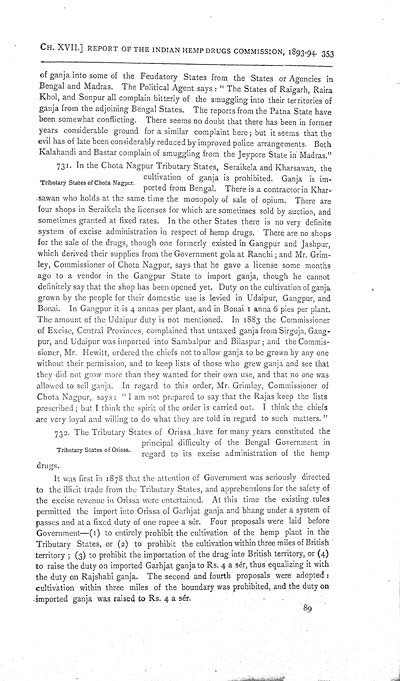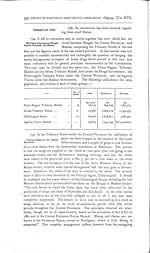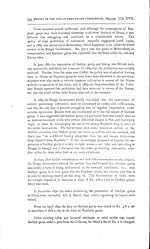Medicine - Drugs > Report of the Indian Hemp Drugs Commission, 1894-1895 > Volume I
(388) Page 353
Download files
Individual page:
Thumbnail gallery: Grid view | List view

CH. XVII.] REPORT OF THE INDIAN HEMP DRUGS COMMISSION, 1893-94. 353
of ganja into some of the
Feudatory States from the States or Agencies in
Bengal and Madras. The Political Agent says: "The States of
Raigarh, Raira
Khol, and Sonpur all complain bitterly of the smuggling into their
territories of
ganja from the adjoining Bengal States. The reports from the Patna
State have
been somewhat conflicting. There seems no doubt that there has been
in former
years considerable ground for a similar complaint here; but it
seems that the
evil has of late been considerably reduced by improved police
arrangements. Both
Kalahandi and Bastar complain of smuggling from the Jeypore State
in Madras."
Tributary States of Chota Nagpur.
731. In the Chota Nagpur
Tributary States, Seraikela and Kharsawan, the
cultivation of ganja is
prohibited. Ganja is im-
ported from Bengal. There is a contractor in Khar-
sawan who holds at the same time the monopoly of sale of opium.
There are
four shops in Seraikela the licenses for which are sometimes sold
by auction, and
sometimes granted at fixed rates. In the other States there is no
very definite
system of excise administration in respect of hemp drugs. There are
no shops
for the sale of the drugs, though one formerly existed in Gangpur
and Jashpur,
which derived their supplies from the Government gola at Ranchi;
and Mr. Grim-
ley, Commissioner of Chota Nagpur, says that he gave a license some
months
ago to a vendor in the Gangpur State to import ganja, though he
cannot
definitely say that the shop has been opened yet. Duty on the
cultivation of ganja
grown by the people for their domestic use is levied in Udaipur,
Gangpur, and
Bonai. In Gangpur it is 4 annas per plant, and in Bonai 1 anna 6
pies per plant.
The amount of the Udaipur duty is not mentioned. In 1883 the
Commissioner
of Excise, Central Provinces, complained that untaxed ganja from
Sirguja, Gang-
pur, and Udaipur was imported into Sambalpur and Bilaspur; and the
Commis-
sioner, Mr. Hewitt, ordered the chiefs not to allow ganja to be
grown by any one
without their permission, and to keep lists of those who grew ganja
and see that
they did not grow more than they wanted for their own use, and that
no one was
allowed to sell ganja. In regard to this order, Mr. Grimley,
Commissioner of
Chota Nagpur, says: "I am not prepared to say that the Rajas keep
the lists
prescribed; but I think the spirit of the order is carried out. I
think the chiefs
are very loyal and willing to do what they are told in regard to
such matters."
Tributary States of Orissa.
732. The Tributary States
of Orissa have for many years constituted the
principal difficulty of the
Bengal Government in
regard to its excise administration of the hemp
drugs.
It was first in 1878 that
the attention of Government was seriously directed
to the illicit trade from the Tributary States, and apprehensions
for the safety of
the excise revenue in Orissa were entertained. At this time the
existing rules
permitted the import into Orissa of Garhjat ganja and bhang under a
system of
passes and at a fixed duty of one rupee a sér. Four proposals were
laid before
Government—(1) to entirely prohibit the cultivation of the hemp
plant in the
Tributary States, or (2) to prohibit the cultivation within three
miles of British
territory; (3) to prohibit the importation of the drug into British
territory, or (4)
to raise the duty on imported Garhjat ganja to Rs. 4 a sér, thus
equalizing it with
the duty on Rajshahi ganja. The second and fourth proposals were
adopted:
cultivation within three miles of the boundary was prohibited, and
the duty on
imported ganja was raised to
Rs. 4 a sér.
89
Set display mode to: Large image | Zoom image | Transcription
Images and transcriptions on this page, including medium image downloads, may be used under the Creative Commons Attribution 4.0 International Licence unless otherwise stated. ![]()
| India Papers > Medicine - Drugs > Report of the Indian Hemp Drugs Commission, 1894-1895 > Volume I > (388) Page 353 |
|---|
| Permanent URL | https://digital.nls.uk/74574842 |
|---|---|
| Description | Chapter XVII, cont. |
| Description | [Volume 1]: Report. |
|---|---|
| Attribution and copyright: |
|




